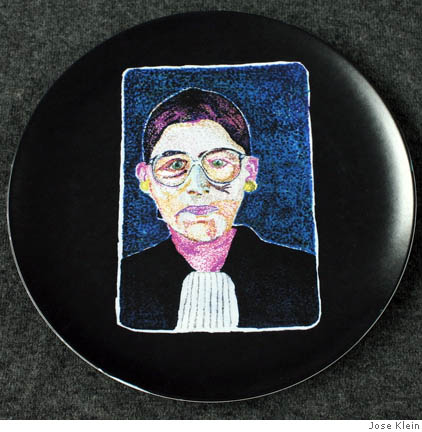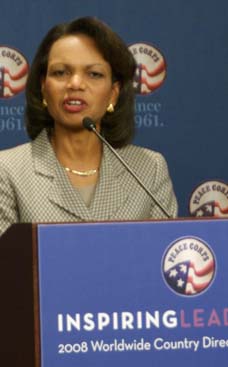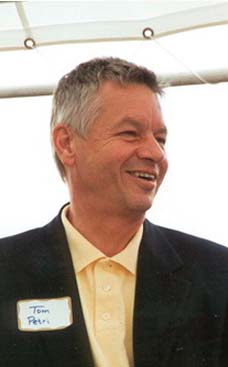
Klein spends nearly every free minute making magic marker drawings. Not just any magic marker drawings, but drawings that are converted to dinner plates Make-a-Plates, specifically, that cheap craft store staple where marker drawings are transferred permanently onto melamine dishware. Klein had never been a drawer, but something swept over him. It wasn't landscapes and still lifes that emerged, but the figures and doctrines that comprise the jurisprudential canon. With a savantlike intensity he began translating law school into odd and remarkably lovely images you can eat off of. There's "Planned Parenthood v. American Coalition of Life Activists," part of the First Amendment series. There's the Punitive Damages collection. There are six plates commemorating the Interstate Commerce Clause. Then there's each of the Supreme Court justices, lovingly rendered. And so it was that Klein had become something of an outsider artist at perhaps the ultimate insider institution.
Suriname RPCV José Klein is plate artist
Justice is served: A Harvard Law grad develops an odd obsession
By Chris Colin, Special to SF Gate
Tuesday, June 9, 2008
Caption: Ruth Bader Ginsburg, from artist José Klein's Supremes collection of melamine plates. Photo courtesy of José Klein
When my old college friend José Klein moved, temporarily, to the Bay Area a decade ago, he didn't know what he'd do with his life. He might write novels, or screenplays, or film criticism. Maybe he'd be an academic. He had a temp-to-perm job at the family law office of the San Francisco Superior Court, and this left him certain about only one thing: He wouldn't be a lawyer.
Last week I visited Klein in Cambridge as he prepared to graduate from Harvard Law School. I didn't ask him to explain how he migrated from point A to point B people rarely have answers for questions like that. I was more curious about the odd pastime he picked up along the way, one that seems to help make point B more palatable to him. Lawyers reading this might recognize the appeal of such a thing. In fact anyone with any ambivalence about his or her field might, though I'd be surprised if someone else has taken this particular route. Klein spends nearly every free minute making magic marker drawings.
Not just any magic marker drawings, but drawings that are converted to dinner plates Make-a-Plates, specifically, that cheap craft store staple where marker drawings are transferred permanently onto melamine dishware. Klein had never been a drawer, but something swept over him. It wasn't landscapes and still lifes that emerged, but the figures and doctrines that comprise the jurisprudential canon. With a savantlike intensity he began translating law school into odd and remarkably lovely images you can eat off of.
There's "Planned Parenthood v. American Coalition of Life Activists," part of the First Amendment series. There's the Punitive Damages collection. There are six plates commemorating the Interstate Commerce Clause. Then there's each of the Supreme Court justices, lovingly rendered. And so it was that Klein had become something of an outsider artist at perhaps the ultimate insider institution.
Klein, 33, is tall and affable, a sports junkie when he's not being a legal plates junkie. He was born in Southern California and there, in high school, he met Rosa, whom he eventually married. The two left San Francisco in 1999 for Amsterdam, then Portland, then Suriname, where they served in the Peace Corps. When they returned, their son, Manu, was born; he'll soon turn 4. Manu's a nascent plate artist, too, though so far his work hasn't touched much on legal themes.
If you studied law, you know the old axiom: Law sharpens the mind by narrowing it. For Klein, something important was getting squeezed out in the process. It's not that his studies left no time for art it was more that they left no time for the stuff art cares about. Somehow the human dramas underlying all that dry legal doctrine were being overlooked.
"These cases become vehicles for rules to be established. But we lose sight of what's profoundly human in them, and they ultimately become abstractions," Klein told me recently in his family's small Cambridge apartment. "I think the plates are an attempt to engage the drama or the humanity, not just the rule. It's more soulful than the study of these rules."
Klein dug out a plate from one of many piles the one commemorating Heart of Atlanta Motel, Inc. v. United States, and depicting a sleepy Southern motel. As he explained, Title II of the Civil Rights Act of 1964 forbade racial discrimination by places of public accommodation. This Atlanta motel refused to accept African Americans, and was charged with violating Title II.
Klein explained that any lawyer will know the case but he wanted to bring out the flesh-and-blood (or at least ink) life behind it. The Heart of Atlanta Motel wasn't just a thing to argue about, it was an actual place, with a swimming pool and a pair of diving boards and hints of a cityscape behind it. To recognize even these banal facts is to breathe life into the doctrine associated with the case.
Klein is no Rembrandt, as he'd readily admit. Still, there's a folk art quality to many of the plates that's compellingly odd and lovely. The contrast to Harvard not typically a folky place only adds to the charm. On top of this is the appeal of a person nudging at the boundaries of his or her field particularly when it's a career that many think needs nudging.
Part of the appeal of outsider art, I think, is that it shines an unexpected light on some aspect of the establishment that needed it. Klein's project would seem to do this, and his professors thought so, too. He was given permission for these plates to count as his thesis a first, surely, in the school's history. These last few months saw an even greater explosion of productivity in Klein. ("I only draw when I breathe," he told me at one point.) After finishing the last batch of his Harvard career, he decided a finale was in order.
There's really only one kind of finale when it comes to dinner plates.
The meal was roast pork, with vegetable lasagna and potatoes on the side. A fellow law student had donated her apartment for the affair, and on the Saturday before graduation, Klein invited a collection of fellow law students over to eat off the faces of Clarence Thomas, Ruth Bader Ginsburg and others.
The reception of the plates could best be described as positive and curious. As in, these plates are neat. And a little weird. And you got credit for this? Klein, in turn, seemed both pleased and what, humbled? to be serving dinner on the faces and cases that had kept them all holed up in the stacks these past three years.
"Law school is all about making the everyday obscure. You take a comprehensible situation where someone is wronged by someone else, and law school makes it inaccessible to the common citizen," he said. "The plate is the opposite. You can pick up a plate, and hold it. It's an everyday object that everyone understands, and knows how to use."
In a few weeks, Klein will pack up his plate-making kit, some clothes and his study materials for the bar exam, and head west. He's been hired for a prestigious two-year judicial clerkship with Martha L. Walters, Associate Justice of the Oregon Supreme Court.
As excited as he is for his clerkship, it's his next plate project we've discussed more a series on wrongful confessions involving two dozen people who have been proved innocent of crimes to which they confessed. Meanwhile he plans to show his existing plates in Oregon, including at an ACLU fundraiser.
But why plates? I asked at one point. Why not paper, or cardboard boxes, or brick walls?
He thought for a moment.
"It's a kids' medium. It was less intimidating to get into it," he said eventually. "Also, I like the idea of the extraordinary work of the court intersecting with the very ordinary act of eating. Everyone eats."
Chris Colin has worked as a writer-editor at Salon, and before that a busboy, a bread deliverer and a bike messenger, among other things. He's the author of "What Really Happened to the Class of '93," about the lives of his former high school classmates, and co-author of "The Blue Pages," a directory of companies rated by their politics and social practices. His writing has appeared in the New York Times, Mother Jones, the New York Observer, McSweeney's Quarterly and several anthologies. He lives in San Francisco.









